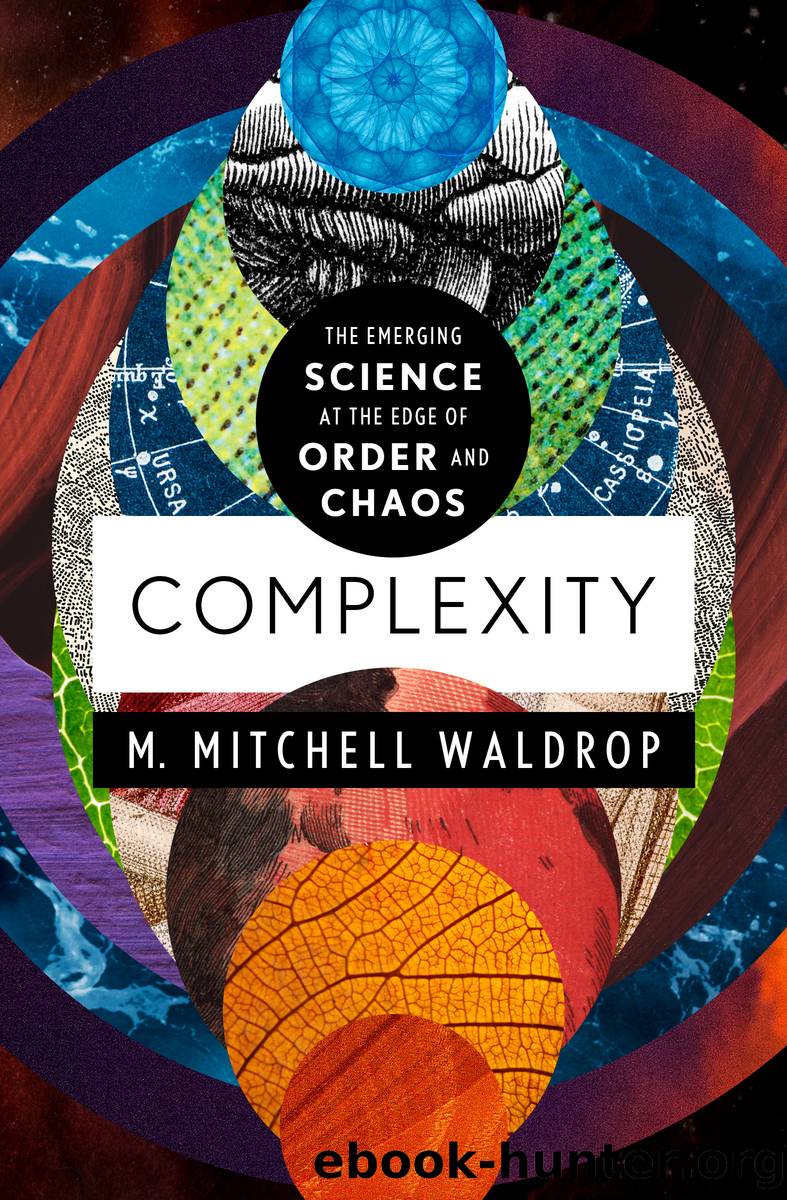Complexity by M. Mitchell Waldrop

Author:M. Mitchell Waldrop
Language: eng
Format: epub
Publisher: Open Road Integrated Media, Inc.
Published: 2019-06-15T00:00:00+00:00
The talk was a hit—especially when Holland pointed out to his audience that Samuel’s program was still pretty much the state of the art in checkers playing some thirty years later. But, then, Holland’s whole approach had been a hit at the meeting. Nor were such impromptu interchanges at all unusual by that point. Participants find it hard to pinpoint exactly when the mood of the economics meeting began to change. But somewhere about the third day, after they had cleared away the early barriers of jargon and mutual confusion, the meeting began to catch fire.
“I found it very exciting,” says Stuart Kauffman, who felt primed for economics after two weeks of talking to Arthur. “In a funny way it was like kindergarten, when you get exposed to all sorts of new things like finger painting. Or it was like being a puppy, running around sniffing at things, with this wonderful sense of discovery, that the whole world was this wondrous place to explore. Everything was new. And somehow that’s what this meeting was like to me. Wondering how these other guys think. What are the criteria? What are the questions in this new field? That’s very much my style, personally. But I think it had that flavor for a fair number of people. We went on talking at one another long enough to hear one another.”
Ironically, considering the physicists’ early skepticism about mathematical abstractions, it was mathematics that provided the common language. “As I look back on it, I think Ken made the right decision,” says Eugenia Singer, who had originally been disappointed at Arrow’s failure to include sociologists and psychologists in the group. “He had the most highly, technically trained economists he could get. And as a result, there was a credibility that was built. The physical scientists were amazed at their technical background. They were familiar with a lot of the technical concepts, even some of the physical models. So they were able to start using common terms and building a language they could talk to each other in. But if they had gotten a lot of social scientists in there with no technical background, I’m not sure the gulf could have been crossed.
After most of the formal presentations were finished, the participants at the workshop started breaking up into informal working groups to focus on particular subjects. One of the most popular topics was chaos, the domain of one group that frequently gathered around David Ruelle in the small conference room. “All of us knew about chaos and had read articles,” says Arthur. “Some of the economists had done considerable research in that area. But I remember that there was an awful lot of excitement in seeing some of the physicists’ models.”
Anderson and Arthur, meanwhile, were part of a group that met out on the terrace to discuss economic “patterns” such as technological lock-in or regional economic differences. “I was almost too tired to do an awful lot of talking or listening,” says Arthur. “I used the working group to quiz Phil Anderson on various mathematical techniques.
Download
This site does not store any files on its server. We only index and link to content provided by other sites. Please contact the content providers to delete copyright contents if any and email us, we'll remove relevant links or contents immediately.
The Complete Stick Figure Physics Tutorials by Allen Sarah(7372)
Secrets of Antigravity Propulsion: Tesla, UFOs, and Classified Aerospace Technology by Ph.D. Paul A. Laviolette(5371)
Thing Explainer by Randall Munroe(3938)
The River of Consciousness by Oliver Sacks(3604)
The Order of Time by Carlo Rovelli(3193)
How To by Randall Munroe(3113)
A Brief History of Time by Stephen Hawking(3024)
I Live in the Future & Here's How It Works by Nick Bilton(2997)
What If?: Serious Scientific Answers to Absurd Hypothetical Questions by Randall Munroe(2704)
The Great Unknown by Marcus du Sautoy(2694)
Midnight in Chernobyl by Adam Higginbotham(2549)
Blockchain: Ultimate Step By Step Guide To Understanding Blockchain Technology, Bitcoin Creation, and the future of Money (Novice to Expert) by Keizer Söze(2496)
Networks: An Introduction by Newman Mark(2406)
The Meaning of it All by Richard Feynman(2355)
Easy Electronics by Charles Platt(2331)
The Tao of Physics by Fritjof Capra(2276)
Midnight in Chernobyl: The Untold Story of the World's Greatest Nuclear Disaster by Adam Higginbotham(2234)
Introducing Relativity by Bruce Bassett(2124)
When by Daniel H Pink(2118)
